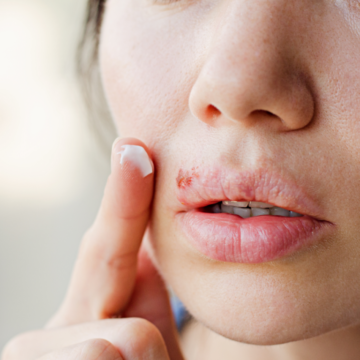A genital herpes outbreak can be really unpleasant – it can get in the way of your social life, be distracting at work and cause a lot of irritation. The good news is that if you know how to heal herpes sores faster, you can avoid the worst of the condition and get on with your life in no time at all.
Let’s look at how to prevent herpes outbreaks and get rid of them faster when they do strike.
How long does a genital herpes outbreak last?
The first genital herpes outbreak you experience after contracting the virus typically lasts between two and four weeks. Subsequent outbreaks will happen around two to six times per year. Everybody is different, but these will usually last about a week, give or take a few days, and normally become less frequent over time.
How to get rid of herpes outbreak overnight
Unfortunately, it is not yet possible to get rid of a herpes outbreak overnight. There are various treatments which make it go away faster – see the medical treatments section below – yet in even the best-case scenario, it will still take a few days to clear up completely.
You may have seen some adverts online which claim to offer immediate cures for the illness. However, it is important to check that these are being sold by genuine medical professionals – there are sadly many scams and false ‘miracle cures’ out there.
How to prevent a herpes outbreak: know the risks
The best way to reduce the chances of a herpes outbreak is to avoid situations which make it more likely the virus will flare-up in the first place. These include:
- Tiredness: if you are tired, your immune system may be weaker than usual. This might allow the herpes virus to break out.
- Menstruation: you might get a herpes outbreak when you are on your period.
- Genital irritation and sex: having sex may also cause an outbreak. If you are dry or sore, consider using a water based lubricant.
- Uncomfortable underwear: underwear made from synthetic materials prevents the skin from breathing, which also causes discomfort and rubbing and may bring on an outbreak.
- Emotional and physical stress: feeling stressed can also cause a herpes outbreak because your body’s immune system is not as strong as usual. Find ways to combat stress such as exercise or meditation.
- Unhealthy food: a well balanced and nutritious diet helps keep the immune system strong.
- Temperature: a herpes outbreak may also be brought on by very hot or cold weather.
Knowing when you are more likely to experience an outbreak means you can prepare and potentially avoid it happening.
Catch a herpes outbreak early
While you cannot always avoid a genital herpes outbreak – sometimes they seem to happen for no reason at all – catching them early means you can avoid the worst. You can usually tell when an outbreak is coming on because you feel a tingling, burning or itching sensation around your genitals or buttocks. You may also feel pain in the lower back, your thighs and knee joints. Soon after, the first sores will appear.
As you get to know your condition better, you will notice how the virus manifests itself. You can then take preventative action.
How to heal herpes sores faster
If you are already having an outbreak, here is how to heal herpes sores faster:
Home treatment
- Ice pack: wrap an ice pack in a flannel or cloth and hold it to the painful area a few times a day to relieve the burning sensation.
- Wear loose-fitting clothes: it is important to allow the skin to breathe, so choose loose-fitting clothes made of cotton.
- Keep the area clean: use clean water or saltwater to gently clean the area around the sores to stop then from becoming infected.
- Pee in the bath or shower: some people find it more comfortable to urinate in the bath or underwater in the shower when they are having an outbreak.
- Don’t touch the sores: avoid the temptation to touch or pick at the sores as this makes it more likely they will become infected.
Medical treatment
Antiviral medications offer a safe and effective way of controlling a herpes outbreak and can make it go away faster. There are three popular oral treatments for genital herpes – aciclovir, valaciclovir and famciclovir:
- Aciclovir is an antiviral medicine which stops the herpes virus from reproducing. It works best when taken as soon as the first symptoms appear – which is why it’s important to spot when a herpes outbreak is likely to happen.
You have to take the tablets three times per day. It is the most cost-effective treatment for genital herpes, although having to take the medicine more often can be an annoyance for some.
- Valaciclovir is similar to aciclovir, although it only needs to be taken twice a day. Some people find it more convenient to take the medicine less frequently – although it is slightly more expensive as a result.
- Famiciclovir works in much the same way as valaciclovir, in that you need not take it as frequently as Aciclovir.
All of these medicines can be used for herpes suppression treatment too, by taking them once per day, although this is usually only recommended if you have very frequent or severe outbreaks (six or more times per year). Taken daily, suppression treatment can reduce the frequency of outbreaks by as much as 80% and may even prevent them altogether. Research has shown that suppression treatment also makes outbreaks milder and shorter when they do happen.
Know how to heal herpes sores faster and live your best life
Knowing how to prevent a herpes outbreak, and dealing with it effectively when you do have one, can make the illness so much more manageable. Using a combination of home treatment and medication, you can stop the virus in its tracks and get back to your normal life in no time at all.
To learn more about genital herpes and how the condition is treated, read our overview page.



